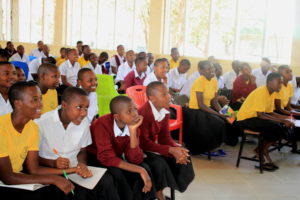Safe Schools Initiative
Goal:
Raise $3,000 per year for the next three years so that the South East of Lake Victoria Diocese (SELVD) can conduct trainings for teachers at all Lutheran schools throughout the diocese. These trainings will empower teachers to
- use forms of discipline other than shaming and caning to motivate their students.
- demonstrate the Fruits of the Spirit—love, joy, peace, patience, kindness, goodness, faithfulness, gentleness, and self-control—in their lives and in their teaching.
- better mentor, guide, and nurture their students both academically and spiritually.
- create an environment that is physically and emotionally safe, where students can flourish.
Why this is important:
 In the 1960s, when the country of Tanzania was founded, the first president Mwalimu (teacher) Julius Nyerere had a dream for what the system of education could be. The Education for Self-Reliance Policy called for an enquiring mind, critical thinking, and self-confidence among students at all levels. During that era “committed teachers began to develop problem-solving approaches to teaching and learning, based on cooperative group work. Students were encouraged to challenge their teachers and fellow students in the classroom with alternative solutions to problems. Positive forms of reinforcement were to be encouraged, including praise for correct answers or good attempts at solution. Competitive ranking of students, especially when displayed publicly, were discouraged. Being ranked as in the bottom of the class was no way to encourage self-confidence. Nor was caning. Corporal punishment began to be challenged at this time by ESR-minded teachers and students at all levels, as a major barrier to achieving ESR objectives.”[1]
In the 1960s, when the country of Tanzania was founded, the first president Mwalimu (teacher) Julius Nyerere had a dream for what the system of education could be. The Education for Self-Reliance Policy called for an enquiring mind, critical thinking, and self-confidence among students at all levels. During that era “committed teachers began to develop problem-solving approaches to teaching and learning, based on cooperative group work. Students were encouraged to challenge their teachers and fellow students in the classroom with alternative solutions to problems. Positive forms of reinforcement were to be encouraged, including praise for correct answers or good attempts at solution. Competitive ranking of students, especially when displayed publicly, were discouraged. Being ranked as in the bottom of the class was no way to encourage self-confidence. Nor was caning. Corporal punishment began to be challenged at this time by ESR-minded teachers and students at all levels, as a major barrier to achieving ESR objectives.”[1]
Sadly, Tanzania as a whole has stepped away from that vision. These days 98% of boys and 91% of girls in Tanzania have been beaten at least once during their education.[2] For most, being hit or threatened with a stick, being forced to kneel on the ground for long periods of time, being hit or pinched with a hand, or being publicly shamed for low grades are frequent occurrences. In 2018, a 13-year-old student was beaten to death by a teacher in the Kagera region, which once again brought the debate over the use of corporal punishment to the forefront.[3] Lutheran schools in Tanzania are not immune to this trend. We have witnessed kids being threatened with sticks in Sunday School and preschool settings. During our first year in Tanzania, we witnessed a male Lutheran teacher beating all of the female students because someone had stolen something and he didn’t know which one. Most teachers have never been explicitly taught classroom management, and therefore fall back on the methods that were used on them as students. Many of our teachers have their own stories of abuse at the hands of teachers when they were students.
 Yet, there is great hope. Over the past 7 years, Mwadui Lutheran Secondary School has moved away from corporal punishment and hopes to inspire Lutheran schools around the region to implement other forms of discipline. Rev. Yohana Nzelu, the headmaster at Mwadui Lutheran Secondary School and Grace Mutabuzi, Director of Education for the SELVD, approached us (Eric and Linda Funke) with the idea of hosting Tanzanian-led seminars for teachers at all the Lutheran schools in this diocese. Because changing school culture is a long, difficult process, they recommended a 3-year initiative to bring awareness and tools to Lutheran teachers. This initiative has the potential to change the lives of dozens of teachers and hundreds of students around the region.
Yet, there is great hope. Over the past 7 years, Mwadui Lutheran Secondary School has moved away from corporal punishment and hopes to inspire Lutheran schools around the region to implement other forms of discipline. Rev. Yohana Nzelu, the headmaster at Mwadui Lutheran Secondary School and Grace Mutabuzi, Director of Education for the SELVD, approached us (Eric and Linda Funke) with the idea of hosting Tanzanian-led seminars for teachers at all the Lutheran schools in this diocese. Because changing school culture is a long, difficult process, they recommended a 3-year initiative to bring awareness and tools to Lutheran teachers. This initiative has the potential to change the lives of dozens of teachers and hundreds of students around the region.
Can you help make this dream a reality?
If you would like to empower Tanzanian teachers to create a safer, more life-giving environment for their students, please click the “Give” button on the right.
[1] “Equity, Justice and Transformation in Education: The Challenge of Mwalimu Julius Nyerere Today.” http://hakielimu.org/files/publications/document48equity_justice_transformn_edu_en.pdf
[2] “School corporal punishment in global perspective: prevalence, outcomes, and efforts at intervention.” https://www.ncbi.nlm.nih.gov/pubmed/28064515
[3] “Tanzanians debate corporal punishment after pupil was beaten to death.” https://www.africanews.com/2018/08/31/tanzanians-debate-corporal-punishment-after-pupil-was-beaten-to-death//


